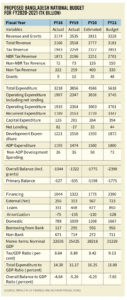The budget must be honest and upfront based on realistic assumptions of the likely economic and financial costs of the pandemic and it must reflect the government’s approach to recover the losses
The Covid-19 pandemic has terrorised the entire world by unleashing a massive wave of infections and causing huge loss of life. According to the Johns Hopkins Covid-19 database the reported number of global infections was about 5.6 million and the number of deaths climbed to almost 352 thousand until May 27, 2020. Bangladesh has not been spared either. The country has thus far reported over 38 thousand infections and 544 fatalities. On March 23 this year, the government imposed a lockdown that has eventually been extended to May 30.
On the economic front, the adverse impacts of the pandemic are still evolving. In the very short term, many economic activities, especially those in urban areas, have come to a grinding halt, while tax revenues and earnings from exports and external remittances are falling. The government has undertaken a series of measures to contain the spread of the plague. It has also announced several relief and stimulus packages – estimated at Tk956 billion (3.3 percent of the GDP) — to help the needy and stem the downward spiral of economic activities.
Even as the Covid-19 pandemic continues to take its human and economic toll, the government is in the process of preparing the national budget for the fiscal year 2020-2021 (FY2021).
This is an extraordinary period for budget formulation in the face of falling revenues, declining rates of GDP growth, declining international trade and external remittance earnings, and growing demand for fiscal stimulus, healthcare spending, and social protection support. To respond to this challenge, the budget formulation needs extraordinary leadership. The budget must also be honest and upfront based on realistic assumptions of the likely economic and financial costs of the pandemic and it must reflect the government’s approach to fight that with a view to containing the loss of lives and livelihoods.
The objective of this article is to give an example of this approach to budget formulation, which is summarised in Table 1. The key assumptions are briefly explained below:
GDP growth: Based on the most recent IMF global GDP projections that assume global economic recovery starting in January 2021 and using the government’s decision to gradually opening up from 31 May, 2020, the GDP is projected to grow by 5 percent in FY2021. This is a healthy growth in the current circumstances. Economic activities will remain constrained in the first half of FY2021 (July-December 2020) owing to Covid-19, but is likely to recover in the second half (January-June 2021). Overall, for the full fiscal year 2021, the 5 percent GDP growth is predicated on continued robust agricultural performance and steady state of the rural economy, the recovery of exports and investments in the second half of FY2021, and the resumption of most urban activities to their normal level by January 2021. Growth will be lower if these assumptions do not materialise.

Revenue projections: The most critical assumption is the tax revenue target for the FY2021 Budget. In FY2020, the actual tax collection up to February 2020 was Tk1,374 billion. Normally, there is a large seasonality effect because many tax payments come in the April-June months. For FY2019, the seasonality coefficient was 1.81 — meaning actual tax revenues were 81 percent higher for the full fiscal year as compared with inflows until February. Applying this seasonality multiplier, in the absence of Covid-19, NBR would have likely collected Tk2,487 billion in tax revenues. Once we allow for the Covid-19 impact that has disrupted economic activity, sharply lowered imports, which is a major tax base for VAT and custom duty revenues, and also forced the government to announce various duty reductions and tax deferments, achieving Tk2,487 billion is an impossible target. Our best estimate at this time is an NBR tax revenue of Tk2,250 billion in FY2020, which is 34 percent lower than the government’s revised budget estimate of Tk3,003 billion. We believe that even the Tk2250 billion estimate is on the optimistic side.
For FY2021, a critical policy need is for the government to bite the bullet and introduce some important tax reforms. With good policy reforms that requires a real effort to introduce the VAT 2012 Law in its original form and make some important changes on the income tax front including digital online tax filing and tax submissions, selective and productive audits, and the simplification of the income tax law, it may be possible to increase NBR tax revenues by 20 percent to Tk2,700 billion. This is also optimistic but feasible with strong political support and solid implementation.
Core Covid-19 expenditure priorities: The Covid-19 has exposed some of the major structural weaknesses in our spending priorities that will need to be addressed in the FY2021 budget, along with the adoption of a medium-term expenditure reform programme during the Eighth Five Year Plan (8FYP).
From the Covid-19 perspective, two most critical reforms are: First, the dismal state of our national healthcare system. This needs a major overhaul and a medium-term action plan. For the FY2021 national budget, two key reforms are the introduction of an Universal Health Care System, drawing from the experience of Thailand; and increase in budget spending on healthcare from 0.7 percent of GDP to at least 1.2 percent of GDP, with a medium-term target of reaching 3 percent of GDP by the end of the 8FYP (FY2025).
Secondly, our social security system is broken and needs substantial revamping along the lines of the NSSS approved by the government in 2015 but never implemented. The major medium-term reforms include consolidation of the multitude of small and often overlapping programs into the 5 core Life-Cycle based programmes advocated in the National Social Security Strategy (NSSS); establishing an online database of all eligible beneficiaries; conversion of all programmes to cash basis; all transfers should be made online using G2P approach; increase in social protection spending excluding civil service pension from 1.2 percent of the GDP to 2.0 percent of the GDP in FY2021 and growing to 3.0 percent of the GDP by FY2025 (end of 8FYP).
Addressing the unemployment challenge: The Covid-19 pandemic will lead to a major unemployment problem in the short term owing to a disruption in non-farm informal activities, cutbacks in formal employment, especially in the RMG sector, and cutbacks in overseas employment. The only viable solution to this would be to push the growth of micro and small enterprises (MSEs). These MSEs employ some 21 million people and need financial support to resume and expand business. The government’s stimulus package includes additional financing schemes for MSEs, but they fall short of demand. Importantly, they will not reach the bulk of the MSEs because of current credit practices that require tax registration, collateral support, and high transaction costs. Solutions must be found to offset these constraints, including the use of smart technology to simplify credit applications, approval and loan disbursements all done online and in real time.
ADP spending and fiscal deficit: Given revenue constraints and the need to increase healthcare spending and social security transfers, the short-term fiscal adjustment should be shared between cutbacks in the ADP and increase in fiscal deficit. The government’s concern to maintain fiscal discipline is admirable. It has rightly sought to increase external borrowings and curtail the ADP. In Table 1, we propose a deeper cut in the ADP than shown in the government’s revised budget. We also propose a higher fiscal deficit financed from a combination of bank and non-bank domestic borrowing. The resulting fiscal deficit and the financing plan is fully consistent with debt sustainability and money growth targets to keep inflation under control and without jeopardising the required growth of private credit to finance the economic recovery.
The author is Vice-Chairman, Policy Research Institute of Bangladesh. He can be reached at: sadiqahmed1952@gmail.com
https://www.tbsnews.net/analysis/towards-covid-19-national-budget-86239







